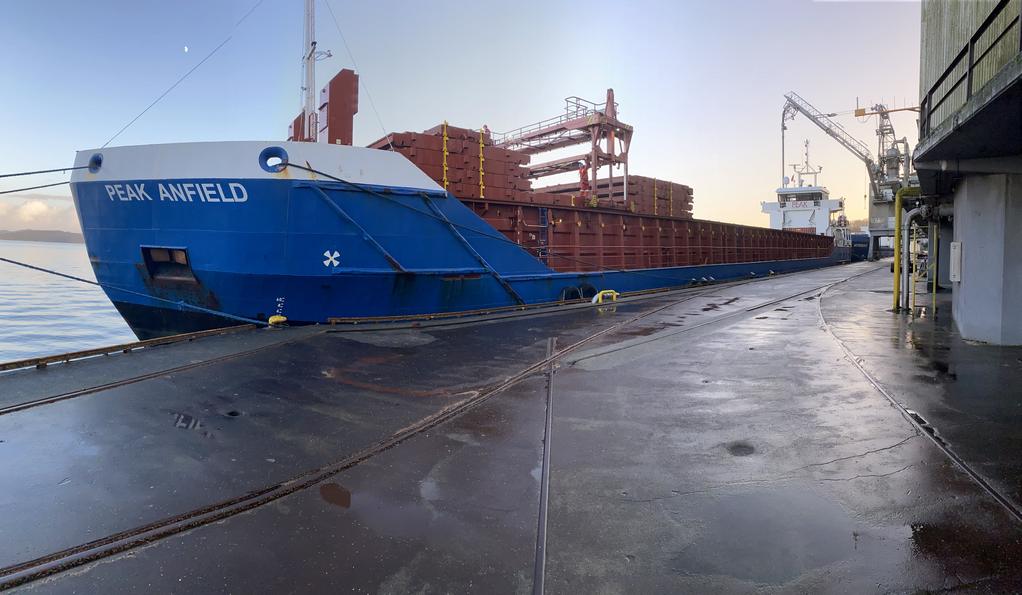Taiwanese shipping company Wisdom Lines is starting 2024 with a $80 million investment in two 84,000 dwt bulk carriers.
The company revealed that its Board of Directors approved the purchase of the vessels, which are set to be constructed by Tsuneishi Group (Zhoushan) Shipbuilding Inc. in China, the Chinese base of Japan’s Tsunesihi Shipbuilding.
Wisdom Lines is paying around $40 million per ship. However, the Taiwanese shipowner did not disclose the expected delivery dates or further details on the vessel design.
In 2023, the company took delivery of seven newbuildings, including two Kamsarmax and five Handy. All of these eco ships, built by Japanese shipyards such as Imabari, Namura, Onomichi, and Tsuneishi, comply with the Tier III nitrogen oxide emission standards.
By the end of 2022, 52% of the Wisdom operating fleet (excluding manage-only vessels) adopted ME type main engines in new eco ships, and all ships under construction are new eco ships with ME type main engines. It is expected that by 2025, the proportion of ships with ME main engines will reach 56%
Not including the latest order, the company has a fleet of 153 ships, of which 15 are on order, predominantly being built at Japanese shipyards. Four dry bulk carriers are set for delivery in 2024, with nine set to follow in 2026 and two more in 2027, data from the company’s website shows.
In September, Tsuneishi Group (Zhoushan) Shipbuilding Inc won a contract to build two 81,200 dwt methanol dual-fuel Kamsarmax dry bulk newbuilds from Greek dry bulk shipping company Diana Shipping.
The first vessel from the batch is set to be delivered by the second half of 2027 and the second by the first half of 2028.
Diana is not the only dry bulk shipping major to join the methanol bandwagon. In October, Safe Bulkers tapped Tsuenishi to construct two methanol-fuelled bulk carriers. The construction is scheduled to be completed in late 2026 to early 2027
By 2035, Tsunesihi Shipbuilding aims to produce vessels exclusively powered by dual fuels, moving away from ships with engines reliant on crude oil.
The shipbuilder has spearheaded the development of methanol-fueled vessels that utilize green methanol as fuel resulting in zero emissions.
This endeavor has resulted in the creation of the world’s inaugural Kamsarmax methanol dual-fueled bulk carrier. Through the incorporation of methanol and an advanced hull design, the Kamsarmax bulk carrier reduces CO2 emissions by 15%. With a substantial methanol fuel tank, the vessel ensures an extended cruising range by enhancing fuel efficiency, as asserted by Tsuneishi.
Tags: Bulk Carrieers, Shipbuilding, Tsuneishi Group, Wisdom Lines



Recent Posts
Port of Brisbane Unveils Vision 2060 to Drive Smarter, Cleaner, and More Connected Future
Wärtsilä to Deliver Hybrid Propulsion Systems for Vertom Group’s New Low-Emission Vessels
Latvian port receives electric Konecranes Gottwald Mobile Harbor Crane
Sustainable Ocean Economy Vital for Human Development, Says UNDP at UN Ocean Conference
Green Hydrogen Costs in India Could Drop by 40%, Says IEEFA-JMK Report
Cavotec Secures €1.55 Million Shore Power Contract for Port of Antwerp-Bruges
APM Terminals and SANY Marine sign landmark agreement to accelerate decarbonisation
The Port of Gothenburg takes big step towards shore power connection for container and car/RoRo vessels